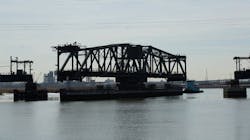Portal Bridge failures to be reduced with new Coast Guard order
The U.S. Coast Guard will not open the Amtrak’s Portal Bridge in Kearny, N.J., for marine traffic on the Hackensack River between 5:00-10:00 a.m. and 3:00-8:00 p.m. in an effort to reduce the risk that the bridge will experience a failure.
The order went into effect March 14. It extends the time the bridge can not be opened by and hour earlier in the morning and evening. Previously, the bridge was not to open to marine traffic, with exceptions, between 6:00-10:00 a.m. and 4:00-8:00 p.m.
The 108-year-old moveable span bridge hosts approximately 450 trains per day and the aging mechanical components sometimes malfunction while opening and closing for maritime traffic. Sen. Bob Menendez (D-N.J.) says the bridge experienced five separate failures in 2018 that resulted in major disruptions. Sen. Menendez along with Sen. Cory Booker (D-N.J.), New Jersey Gov. Phil Murphy and Amtrak requested the new restrictions on the bridge opening following a series of malfunctions on Oct. 30, 2018, which forced the delay and cancellation of 164 New Jersey Transit and Amtrak trains.
“Taking this significant step will help alleviate pressure on the Portal Bridge, restore some reliability to the system and—most importantly—give riders some peace of mind,” said Sen. Menendez. “Every time the Portal Bridge fails, the disruptions spread across our transportation system faster than the plague.”
The Coast Guard restriction on marine traffic during peak rush hours has a limited exception due to tidal restrictions. It remains in effect for six months and can be extended.
Elected officials at the event applauded the decision as a boost for commuters.
“New Jersey commuters are regularly subjected to train delays because they travel across the 108-year-old Portal Bridge every day,” said Sen. Booker
Gov. Murphy added, “The U.S. Coast Guard’s decision to further limit bridge openings during peak traffic hours will go a long way toward reducing malfunctions and providing New Jersey commuters with faster and more reliable service.”
While New Jersey and Amtrak riders can expect better service over the bridge, the ultimate goal is to replace the existing structure.
“This agreement provides tens of thousands of customers with immediate relief from painful delays resulting from ill-timed failures of the Portal Bridge,” said NJ Transit Executive Director Kevin Corbett. “We continue to await federal funding for a new high-level Portal Bridge which will end this century old problem once and for all.”
Portal Bridge stakeholders will have to wait a bit longer for federal funding. The Federal Transit Administration released its FY20 funding recommendations for the Capital Improvement Grants (CIG) program on March 15 and the Portal Bridge project received a “Medium-Low” rating, which makes it ineligible for CIG funds. The rating can be changed, and FTA noted in its report that any project’s rating should not be an indication of its final success or failure.
“[Gateway Program Development Corporation] and all our partners are doing everything we can right now both to move Gateway forward and to improve the daily commute and quality of life for 200,000 riders. Keeping this century-old swing bridge closed and locked more reliably during the rush hours is an important part of meeting this commitment,” Jerry Zaro, Chairman and N.J. Trustee, Gateway Program Development Corporation said. “But there should be no mistake that the long-term solution is a new, 21st Century Portal North Bridge that no longer needs to open at all, is more reliable, resilient and keeps more people moving. Early work has started on Portal North Bridge, now it’s time for major construction to start on a newer, better bridge for the future.”
About the Author

Mischa Wanek-Libman
Group Editorial Director
Mischa Wanek-Libman is director of communications with Transdev North America. She has more than 20 years of experience working in the transportation industry covering construction projects, engineering challenges, transit and rail operations and best practices.
Wanek-Libman has held top editorial positions at freight rail and public transportation business-to-business publications including as editor-in-chief and editorial director of Mass Transit from 2018-2024. She has been recognized for editorial excellence through her individual work, as well as for collaborative content.
She is an active member of the American Public Transportation Association's Marketing and Communications Committee and served 14 years as a Board Observer on the National Railroad Construction and Maintenance Association (NRC) Board of Directors.
She is a graduate of Drake University in Des Moines, Iowa, where she earned a Bachelor of Arts degree in Journalism and Mass Communication.
